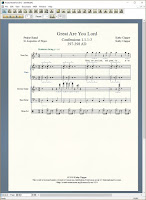On the first page of his autobiography St. Augustine of
Hippo wrote, “Lord, teach me to … praise Thee.” Then he wrote Confessions in praise of God. I wondered
why, given the eloquence of his praise, he never set his prose to music.
Music played a pivotal role in his spiritual journey. Music
moved him deeply; he was intensely stirred by singing the Psalms. He was
musically literate. His six books on music influenced music in the West for
centuries to come. A history of hymn writing preceded him. His contemporaries
wrote hymns. If Augustine wished to praise God, why did he not set his praises to
music?
I learned that for Augustine:
·
Music was an intellectual
pursuit, not an artistic endeavor.
·
Studying the structure and
components of music made sense of the world and man’s place in it.
·
Music could draw a person
to God, but it gratified the senses.
·
Gratifying the senses took
a back seat to intellectual pursuit.
·
Meaning was more important
than emotions.
St. Augustine was critical of his emotional response to
music!
God answered Augustine’s opening prayer in Confessions. His autobiography is filled
with praise to God. I wondered, could I take Augustine’s written praises and
turn them into praise music, something that Augustine’s view of music wouldn’t
allow? Plainchant and responsorial singing were the genre of his day. But the
exuberance of his praise suggests a music style that moves. Perhaps I owe St.
Augustine an apology for setting his prose to swing.
From the album
“The HymnBook – Thirty-Four Hundred Years of Praise” this video is scrolling
playback of the song.
Kathy
You can
get print (PDF) and/or digital (MusicXML™) sheet music for Great Are You Lord.
 |
 |
|
(MusicXML™ is
the standard open format for sharing digital sheet music. Check the help files
in your music notation app for directions on importing MusicXML™ files.)
|
Click here for a modern translation of Confessions.
No comments:
Post a Comment